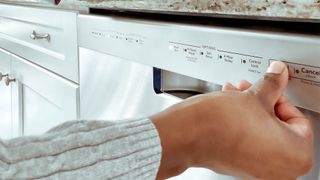We use dish soap to create plentiful bubbles, enough to fill the sink, and it is very effective at removing grease and stains from our plates, cutlery, and pans. Would it be quite so effective when used in a dishwasher though? Unfortunately, this isn’t the best solution to your troubles. The best dishwashers (opens in new tab) are designed to run on very specific detergents, so dish soap will not function quite so effectively inside your machine, and could actually cause real damage if you add too much.
Can you use dish soap in a dishwasher?
No, you should not use dish soap in a dishwasher. Dish soap is designed to lather, so it’s not a good idea to put it in a contained area such as the inside of a dishwasher. While dish soap and detergent may do a very similar job on the surface, detergent is designed to work inside dishwashers and remove grime and residue from your dishes using enzymes, which do not lather. If you do use dish soap inside a dishwasher, even a small amount, you can expect it to foam uncontrollably. So much so that those who have tried to use dish soap in a dish washer have often been left with sudsy, slippery floors! Not only is this a huge inconvenience, but it can actually be quite dangerous. Firstly, if left unattended (as we so often do with dishwashers) the suds can travel quite far in your home. This is a slipping risk, which can cause serious injury, and it can also cause damage to kitchen floors and carpets.
What to do if you put dish soap in a dishwasher?
If you’re reading this having already placed dish soap inside your dishwasher, you ought to switch it off immediately and let the dishwasher drain. The sooner you do this, the better, because it does not take long for suds to get out of control! Then, you should begin the process of removing the remnants of dish soap from the dishwasher. It is actually quite difficult to remove dish soap from your dishwasher, and even a tiny amount can lather up enough to cause disruption to your laundry routine. To avoid this, the best thing to do is empty the dishwasher entirely. Plates and glasses can fill up the internal capacity of the dishwasher, leaving less space and making an overflow more likely, so it is best to leave them out while you clear out the remnants. Then, it’s not just as simple as running another cycle. Rinse any obvious suds away from the inside of the dishwasher and make sure they are washed away before you turn the dishwasher on again. Once you are satisfied that you have removed the remaining dish soap from the inside of your dishwasher, you should give it a full rinse. Do this by turning on a cycle but without adding any detergent or loading any dishes back into the machine. This will hopefully cleanse any remaining suds from the machine. After this point you can use it as normal. That is, if you have any regular detergent or an alternative…
Can you make your own dishwasher detergent?
Knowing how to make your own dishwasher detergent can save you when you’re in a tight spot and low on store-bought detergent. This can actually save you money in the long-term, too, because if bought in bulk the ingredients to make homemade dishwasher detergent can be significantly less expensive than pods or tablets. The mix is a dry mix, made of three key ingredients in equal parts:
1 cup of washing soda1 cup of baking soda1 cup of salt
The salt is only really necessary if you have hard water where you live and need to deal with limescale. Combine all of your ingredients by mixing them together in a large container, before adding two tablespoons to the soap container in your dishwasher. If you want to use your homemade detergent on a regular basis, you may wish to add some scented ingredients. Some recommend adding unsweetened drink mix, which is powdered and can therefore be added to the dry mix before loading into the dishwasher. Another option is to add essential oils like peppermint or lavender to your soap container before you switch it on. It is better to add this to the soap container than into the jar you’re using to store your detergent, as oils will disrupt the powdered consistency.


